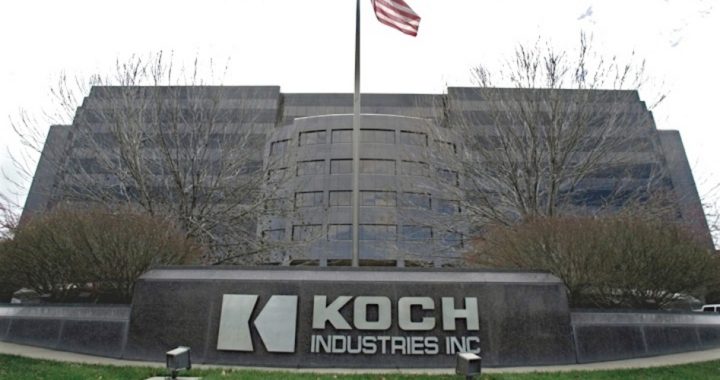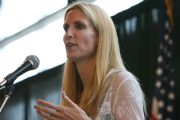
In Jane Mayer’s expose of Charles Koch, the billionaire conservative running Koch Industries in Wichita, Kansas, she made it sound as if she were shedding the light on Koch’s political activities for the very first time. Titled “Covert Operations,” Mayer noted that the growth of Koch Industries since Charles and his brother David took over its operations after the death of their father, Fred Koch, in 1967, has made each of them multi-billionaires — somewhere in the neighborhood of $25 billion each. Koch Industries operates oil refineries in Alaska, Texas, and Minnesota, 4,000 miles of pipeline, along with Brawny paper towels, Dixie cups, Georgia-Pacific lumber, Stainmaster carpets, the spandex product Lycra and generates an estimated $100 billion a year in revenues.
But the real lowdown, according to Mayer, is how they are investing their wealth:
The Kochs are longtime libertarians who believe in drastically lower personal and corporate taxes, minimal social services for the needy, and much less oversight of industry — especially environmental regulation.
And they are doing it with a flourish. Mayer quotes Charles Lewis, the founder of the Center for Public Integrity — calling it a “non-partisan watchdog group” which in fact is funded by internationalist socialist George Soros’ Open Society Foundation and the Ford Foundation, among others, to “reveal abuses of power, corruption and dereliction of duty by powerful public and private institutions…” — as saying:
The Kochs are on a whole different level. There’s no one else who has spent this much money. The sheer dimension of it is what sets them apart…
Charles Koch’s efforts are based on both the short-run — determined to keep President Obama a one-term president and turn control of the Senate back to the Republicans, as well as the long-run — by funding generously think-tanks that influence public opinion and change the “conservative conversation” for the next generation of citizen activists.
Koch provided the start-up capital for the Cato Institute and now writes large checks on a regular basis to the Institute for Humane Studies (IHS), the Mercatus Center at George Mason University, the Bill of Rights Institute, the Heritage Foundation, Americans for Prosperity, and the Heartland Institute. And this is just a short list of the nearly 200 institutions of higher learning that are funded in the United States by his Charles Koch Foundation.
A specific example of his long-range thinking is his support of the Charles G. Koch Summer Fellow Program at the IHS which has supported nearly 1,000 students during an eight-week internship designed to recruit and train them into becoming young libertarians. The invitation from IHS reads:
The Charles G. Koch Summer Fellow Program combines a paid public policy internship with two career skills seminars and weekly policy lectures. You’ll gain real-world experience, take a crash course in market-based policy analysis, and hone your professional skills. The intensive ten-week program begins in June and includes a $1,500 stipend and a housing allowance.
Despite a stated desire to maintain a low profile, Koch has made an increasing effort to go public about his intents and purposes. An interview with Stephen Moore in the Wall Street Journal in May of 2006 was followed recently by a letter he wrote to the Journal explaining his role in turning the conversation:
For many years, I, my family and our company have contributed to a variety of intellectual and political causes working to solve these problems [of government overspending and deficits].
Because of our activism, we’ve been vilified by various groups. Despite this criticism, we’re determined to keep contributing and standing up for those politicians, like Wisconsin Gov. Scott Walker, who are taking these challenges seriously.
He went after business owners who have found it easier to lobby for government benefits than to compete directly in the marketplace:
Too many businesses have successfully lobbied for special favors and treatment by seeking mandates for their products, subsidies (in the form of cash payments from the government), and regulations or tariffs to keep [their] more efficient competitors at bay.
Crony capitalism is much easier than competing in an open market…
He explained why Koch Industries had to go along with government interventions and manipulations with which it strongly disagreed:
Because every other company in a given industry is accepting market-distorting programs, Koch companies have had little option but to do so as well, simply to remain competitive and help sustain our 50,000 U.S.-based jobs. However, even when such policies benefit us, we only support the policies that enhance true economic freedom.
For example, because of government mandates, our refining business is essentially obligated to be in the ethanol business. We believe that ethanol — and every other product in the marketplace —should be required to compete on its own merits, without mandates, subsidies or protective tariffs. Such policies only increase the prices of those products, taxes and the cost of many other goods and services…
Even though it affects our business, as a matter of principle our company has been outspoken in defense of economic freedom. This country would be much better off if every company would do the same. Instead, we see far too many businesses that paint their tails white and run with the antelope.
Koch continued his explanation in another letter, decrying the impact government programs and regulations were having on the moral fiber of the country:
No centralized government, no matter how big, how smart or how powerful, can effectively and efficiently control much of society in a beneficial way. On the contrary, big governments are inherently inefficient and harmful…
Repeatedly asking for government help undermines the foundations of society by destroying initiative and responsibility. It is also a fatal blow to efficiency and corrupts the political process.
Partly because of his determination to redirect the freedom conversation and partly because his efforts are beginning to have an impact, Koch is now coming into the public square with his beliefs and efforts. In the short run, he hopes his efforts will first show up in the November elections, but he also is working to influence the elections of 2016, 2020 and out.
Photo: The Koch Industries, Inc. headquarters is shown on Nov. 14, 2005, in Wichita, Kan.: AP Images



